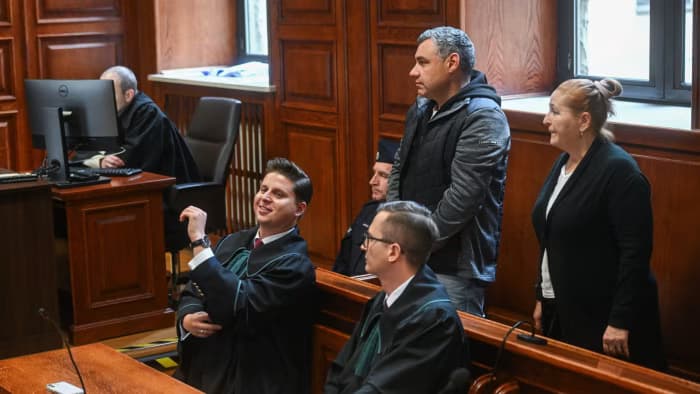We're loading the full news article for you. This includes the article content, images, author information, and related articles.
A Polish court has refused to extradite a Ukrainian national to Germany, citing the act against the Nord Stream pipelines as a 'just' response in wartime, a decision welcomed by Poland's Prime Minister.

A Polish court on Friday, October 17, 2025, rejected Germany's request to extradite Volodymyr Zhuravlyov, a Ukrainian citizen suspected of involvement in the 2022 Nord Stream gas pipeline explosions. The Warsaw District Court ordered Zhuravlyov's immediate release, with Judge Dariusz Lubowski stating that if Ukraine was responsible for the attack, it constituted a "just" act in the context of the ongoing conflict with Russia.
This ruling marks a significant development in the ongoing international investigation into the sabotage of the critical energy infrastructure. Polish Prime Minister Donald Tusk publicly supported the court's decision, posting on X (formerly Twitter) that the ruling was "right" and that "the case is closed."
The Nord Stream 1 and Nord Stream 2 pipelines, designed to transport natural gas from Russia to Germany via the Baltic Sea, were severely damaged by a series of underwater explosions on Monday, September 26, 2022. The blasts occurred in international waters within the economic zones of Denmark and Sweden, rendering three of the four pipeline strands inoperable. At the time of the explosions, Nord Stream 1 had ceased operations, and Nord Stream 2 had not yet entered service, with Germany having suspended its certification process shortly before Russia's full-scale invasion of Ukraine in February 2022.
Initial blame for the sabotage was widely directed at Moscow, but subsequent investigations have seen signs of potential Ukrainian involvement emerge. Kyiv has consistently and vehemently denied any role in the explosions, with Ukrainian officials, including President Volodymyr Zelenskyy and presidential advisor Mykhailo Podoliak, calling such claims "absolute nonsense" and suggesting they are a Russian provocation.
Extradition cases within the European Union are typically straightforward. However, the Nord Stream case has proven complex due to its geopolitical implications. Germany's investigation into the sabotage has reportedly identified seven suspects, all Ukrainian citizens, and issued arrest warrants. Volodymyr Zhuravlyov was detained in Poland in late September 2025 based on a European arrest warrant issued by German authorities.
Zhuravlyov's lawyer, Tymoteusz Paprocki, argued that his client would not receive a fair trial in Germany and that, in the context of an armed conflict, actions taken to defend one's homeland against an aggressor should not be subject to criminal responsibility. Judge Lubowski's ruling echoed this sentiment, asserting that Ukrainians could not be considered terrorists or saboteurs for weakening an enemy in defense of their homeland.
This Polish court decision follows a similar ruling by Italy's Supreme Court on Tuesday, October 15, 2025, which overturned the extradition of another Ukrainian national, Serhii Kuznetsov, also suspected in the Nord Stream blasts. Kuznetsov, arrested in Italy in August 2025, is accused by German authorities of being a mastermind of the operation.
Poland has historically opposed the Nord Stream pipelines, viewing them as increasing Europe's dependence on Russian gas and a potential geopolitical weapon for Russia. Prime Minister Tusk has previously stated that the problem was not the pipelines being blown up, but rather that they were built in the first place, and that extraditing the suspect would be against Poland's national interests.
Ukrainian officials have consistently denied any involvement. Mykhailo Podoliak, an advisor to President Zelenskyy, stated that such an act would require extensive technical and financial resources, which only Russia possessed at the time.
The Polish court's decision, coupled with Italy's earlier ruling, complicates Germany's ongoing investigation into the Nord Stream sabotage. It also highlights the diplomatic tensions surrounding the incident, particularly between Ukraine and its Western allies, who are providing crucial support in the war against Russia. The United Nations has emphasized the importance of avoiding the politicization of findings and prioritizing cooperation and dialogue in the investigation.
Despite extensive investigations by Danish, German, and Swedish authorities, no definitive conclusions have been reached regarding who was responsible for the Nord Stream blasts. While German investigators have pointed towards a pro-Ukrainian group, they have not alleged direct involvement by the Ukrainian government. Ukraine continues to deny any role, suggesting the claims are part of a disinformation campaign.
The German investigation remains ongoing, and it remains to be seen how these recent extradition denials will impact its progress. The international community will be watching for further developments and any potential diplomatic ramifications arising from the differing legal interpretations and national interests at play.
Keep the conversation in one place—threads here stay linked to the story and in the forums.
Sign in to start a discussion
Start a conversation about this story and keep it linked here.
Other hot threads
E-sports and Gaming Community in Kenya
Active 9 months ago
The Role of Technology in Modern Agriculture (AgriTech)
Active 9 months ago
Popular Recreational Activities Across Counties
Active 9 months ago
Investing in Youth Sports Development Programs
Active 9 months ago